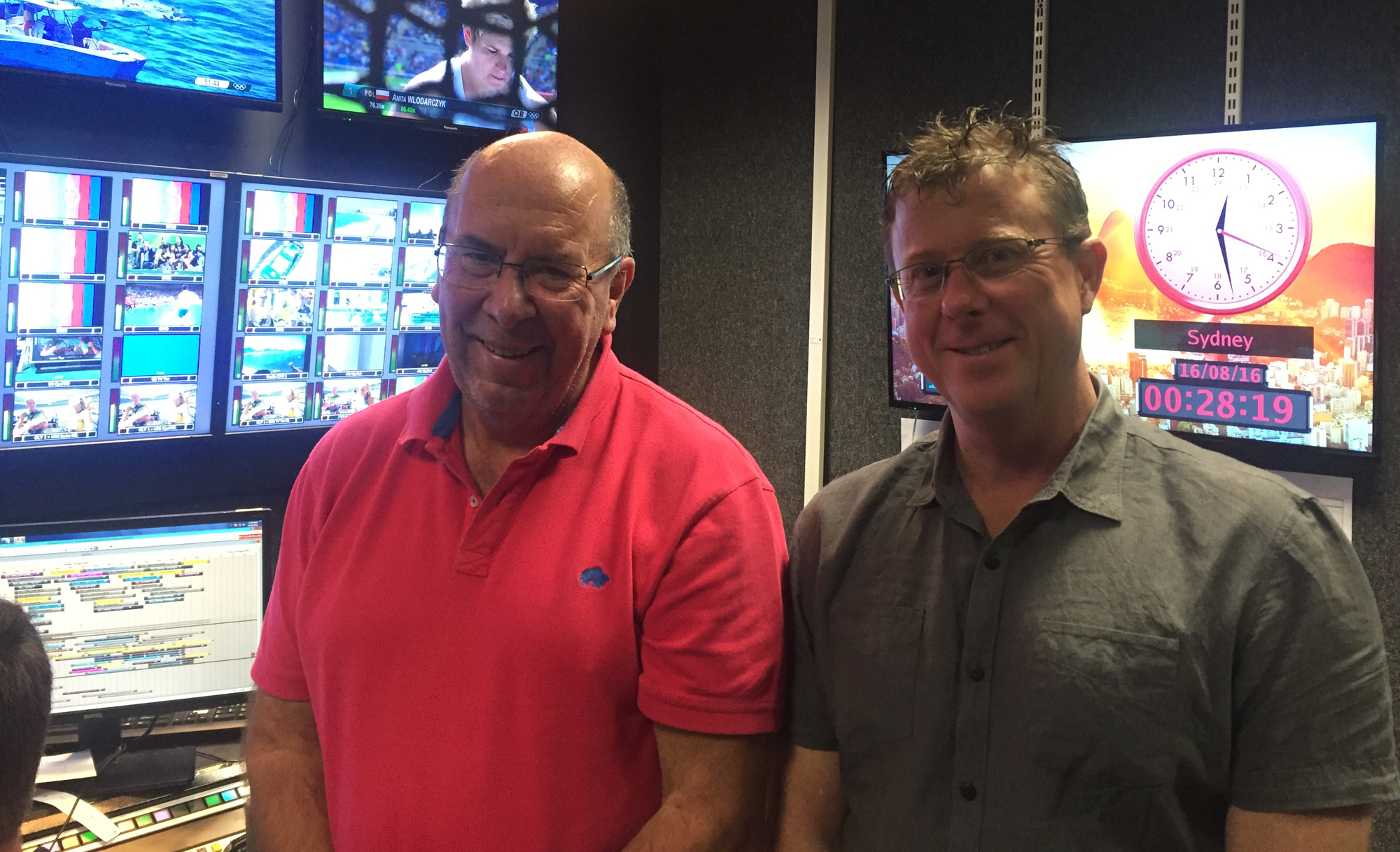Live from Rio 2016: Despite Dramatic Time Shift, Australia’s Seven Network Prides Itself On Live
Sydney may be 13 hours ahead of the action here in Rio but that hasn’t stopped Australian rightsholder Seven Network from going all in on its fully live coverage of these Summer Olympic Games. In fact, the Aussies will be the first to tell you, it’s just life as a supporter of sport.

Seven Network’s GM, Network Sport Cal Southey (left) and Network Telecommunications & IT Infrastructure Manager David Watts are leading the Australian network’s Olympics operations at the IBC in Rio.
“Aussies are used to getting up at the middle of the night to watch things from oversees in the wrong time zone,” laughs Col Southey, General Manager Network Sport for Seven Network Limited. “It’s what we do. We’re real sports nuts and we’re always getting up in the middle of the night to watch TV. It doesn’t matter it is or where it is in the rest of the world, its almost always the middle of the night for us.”
The late nights have also done wonders for streaming numbers. Through the first nine days of these Olympics, Seven has logged 23.5 million streams, making Australia the fourth biggest streaming nation at these Games.
Seven Network has about ¼ of its total Olympics workforce here in Rio with a heavy amount of work being done back in the network’s Sydney studios. The network is working closely in a partnership with NEP Australia, which is supporting Seven in both a technical and production capacity.
Seven’s Network Telecommunications and IT Infrastructure Manager David Watts negotiated a deal with Telstra Australia to get 20 HD SDI paths back to Sydney. The team in Rio hands over the signals to Telstra, who encodes it, carries it to Australia, adds full redundancy, before it arrives at NEP Australia’s facility and is finally sent to Seven’s mothership in Sydney.
“It’s been amazingly successful,” says Southey, before joking, “I’ve been [worried] that a shark is going to bite the fiber-optic in half, but David assures me that that’s not going to happen.”
Ten sports have been targeted for unilateral coverage by Seven Network, including swimming, basketball, athletics, track cycling, and diving. On-site commentators are also on-site in those venues as the network looks to add some Australian color in events that Australians may excel in.
“If an Aussie wins, we’re going to get that reaction of them turning around to look at the board because OBS will cover that,” acknowledges Southey. “If an Aussie finishes second, we’re not going to get that reaction shot. So we are putting that unilateral camera in to get that shot. It’s not for when they win, it’s actually for when they don’t win.”
On top of that, Seven is adding Australian commentary – in collaboration with the BBC and Sky New Zealand – on many more events but having those announcers call games off a screen both here in Rio and at home in Australia.
Seven Network is also taking a unique approach to on-site studio coverage in Rio. While many international broadcasters have taken a studio position in the TV towers at the Olympic Village, Seven has chosen to go with smaller, one-robotic-camera remote setups at various locations including two in the Australian section of the Athletes Village [one out in the public square, the other in a hotel room for a more intimate setting] and another spot at Ipanema Beach where many Australian sailors, triathletes, and more are staying. The network has done a deal with IOC Media where a representative can bring an athlete to the camera position, set up their mic and earpiece, turn on the lighting, and hand over the interview to the Seven Network crew back at the IBC.
“There are two reasons for that,” notes Southey. “One, we are in such a beautiful city and we want to show that off. To Seven, the Olympics aren’t just about the Games, it’s about the city and the culture. Second, is it gives us easier access to athletes. Rather than have an athlete travel all the way over to the IBC, go through security, and all of that, they can do it from their own hub with their family and their mates around them. It’s a party atmosphere there after winning a medal.”
Seven Network is offering a whopping of 22 hours of live Olympics coverage per day on its main sport channel. There’s also two other supplementary channels churning out 18-19 hours per day of Olympics coverage, each targeting a different target demo, including women’s sports, which Seven has made a strong commitment to.
“Women’s sport is so important to Australia and so important to Seven,” says Southey. “In fact, I’m a firm believer that women’s sport is the future. The interest rate in Australia is just rising incredibly and rightfully so.”
Southey also expressed tremendous admiration for the nearly 100 staffers here in Rio who have performed despite facing many challenges that have become the nature of the beast here in Rio, including transportation, accommodations, and other logistical challenges.
“I’m just so proud of what we are putting on air,” says Southey. “It’s just stunning.”
